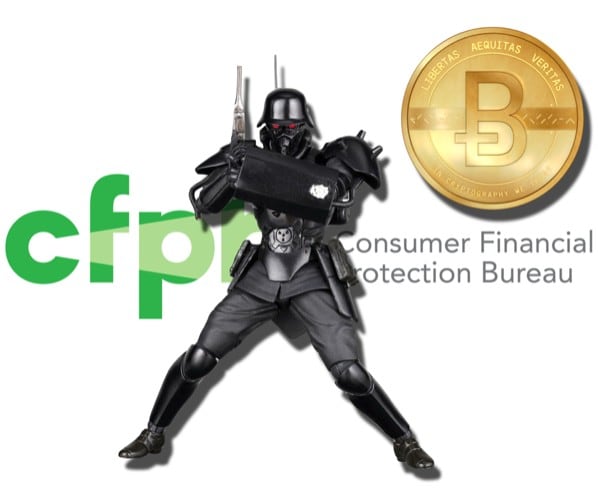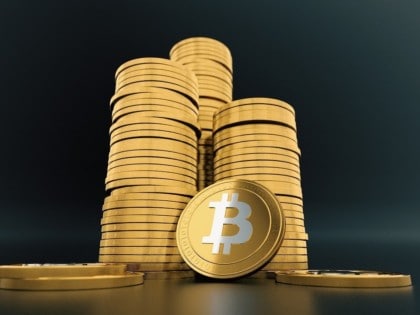
The Consumer Financial Protection Bureau (CFPB) released a new consumer advisory warning on virtual currencies Monday, informing consumers about this ‘to the moon’ business on the internet and offering guidance on how to stay protected against fraud, hackers, volatility, and scams.
The advisory is likely in response to the June report issued by the Government Accountability Office strongly encouraging the CFPB to get more involved with Bitcoin.
Virtual currencies offer the potential for innovation, the report says, but there are still many issues that have yet to be resolved – some critical. This is very true – I’ll give them that.
“Consumers are stepping into the Wild West,” CFPB Director Richard Cordray said in a statement, acknowledging that virtual currencies do have “many potential benefits” including easier payment processing.
The report specifically mentions Bitcoin, Ripple, and Dogecoin, along with the following risks:
Hackers – “Virtual currencies are targets for highly sophisticated hackers, who have been able to breach advanced security systems.”
The advisory lists four separate warnings regarding hacking, and says that using Bitcoin makes your computer and phone attractive targets for malware. These are valid warnings, as hackers are definitely targeting users for bitcoins. Computers are susceptible to being hacked and if your coins are stolen, you don’t stand much of a chance of getting them back. If your credit card is fraudulently charged or your bank is hacked, you are generally protected. But assuming you use two-factor authentication and a strong password on your encrypted wallet, are you at more risk than with credit cards or online bank accounts whose security is generally of lesser quality? And bitcoins can’t be counterfeited, so you’re safe there.
Fewer protections – “If you trust someone else to hold your virtual currencies and something goes wrong, that company may not offer you the kind of help you expect from a bank or debit or credit card provider.”
There is little you can do to reverse a Bitcoin transaction (for better or worse – it can be a good thing), your money isn’t insured, and you can’t file a credit dispute against a transaction. These factors definitely turn some consumers off, and from their perspective, understandably so. There is risk involved with using Bitcoin. Why would someone who doesn’t ideologically support (or even know) what Bitcoin stands for be inclined to put their money at risk? Especially if they are satisfied with the current fiat system?
Cost – “Virtual currencies can cost consumers much more to use than credit cards or even regular cash.”
Wait, what? I assume they mean that with the volatility and price fluctuations, consumers could lose money if there was a large price swing. Because surely they know that virtual currencies do not inherently cost more than credit or cash, but the opposite – they cost less to use.
And when you compare the devaluation of the dollar over the past few decades to Bitcoin’s rapid increase in overall value, it becomes even more apparent that using bitcoin will cost you less in the long run. Not to mention that the Federal Reserve has specifically stated that it is trying to devalue the dollar 33 percent over the next 20 years. (The same Federal Reserve who admitted to causing the Great Depression – just one reason why trusting an open-source code can be better than trusting humans with our monetary policy.)
Commenting further on the cost of using Bitcoin, the advisory says, “If you buy something with virtual currency you may be paying more than you would pay if you paid in dollars. Know how the merchant sets its exchange rate and look for mark-ups or other fees.”
Scams – “Fraudsters are taking advantage of the hype surrounding virtual currencies to cheat people with fake opportunities.” Valid point. Do your due diligence.
Along with advising consumers twice that they should read agreements with wallet providers and ask if the company would reimburse fraudulent transactions, the report warns against using Bitcoin ATMs.
“Bitcoin ‘ATMs’ are not ATMS at all. They may look like traditional ATMs, but unlike ATMs that you may associate with your checking and savings accounts, Bitcoin kiosks do not connect to your bank and may lack many of the safeguards you would expect. They may also charge high transaction fees – media reports describe transaction fees as high as 7% and exchange rates $50 over rates you could get elsewhere.”
The report continues:
“But virtual currencies aren’t regular money. To begin with, virtual currencies are not issued or backed by the United States or any other government or central bank. No one is required to accept them as payment or to exchange them for traditional currencies.”
Ahh yes, written as if the U.S. dollar and its fiat counterparts are the only forms of real money. Luckily for consumers, one of Bitcoin’s strongest attributes is that it’s not issued or backed by a government or central bank. And hopefully consumers realize that no one is required to accept cash as a form of currency either.
For virtual currencies to work, “they depend on the processing power of vast networks of unidentified, private computers around the world, which maintain and update a public ledger called the ‘blockchain.’”
Whereas for the U.S. dollar to work, consumers must only place their trust in the largest, non-transparent criminal organizations that have ever existed.
The CFPB provides an example of a bitcoin-gone-wrong scenario:
“According to online accounts, after learning about a Bitcoin exchange from an internet search, Nicole transferred cash to a bank account designated by the exchange’s representative, Jackson, who she had e-mailed with and even spoken to on the phone. Nicole never received her bitcoins, however. When Nicole tried to call Jackson again, the line was disconnected.”
The report mentions that virtual currencies are still experimental and rightfully says that there are big issues yet to be resolved, using the 51 percent attack as an example. But instead of explaining how a 51 percent attack would work, or how unlikely it is to actually occur, the report fails to elaborate or provide any additional information, instilling more unnecessary uncertainty in consumers.
“In particular, the critical component of the entire system—the public ledger known as the blockchain—is maintained by vast unidentified private computer networks spread all over the world. It is possible that elements of these networks could abuse the power that comes with maintaining the ledger, for example by undoing transactions that you thought were finalized.”
The advisory also criticizes Bitcoin’s pseudonymous nature, informing consumers that information about every transaction is publicly shared and stored forever. The CFPB notes that motivated people could link your transactions to other transactions and your other public keys, as well as your computer’s IP address.
“So it is possible that others will be able to estimate both how much Bitcoin you own and where you are.”
The CFPB also announced that they have added a Bitcoin complaint center to their database. As was mentioned in the Government Accountability Office report from June, as of February 2014, only 14 out of 290,000 complaints in the CFPB database mentioned virtual currency or Bitcoin.
Although perhaps intentionally vague on many issues, the CFPB’s job is to warn consumers of potential risks, and it seems they have done a decent job at that. The report is accurate in the fact that Bitcoin is lacking the same protections afforded to users of the traditional credit and banking system — for better or worse. How exactly these protections can be offered without compromising the Bitcoin protocol is up for debate, but until everyday consumers have these same protections with Bitcoin, it will struggle to see full mainstream success. However, it is true that the Bitcoin network still needs time to improve before going full mainstream, so taking it slow is probably a good thing.







